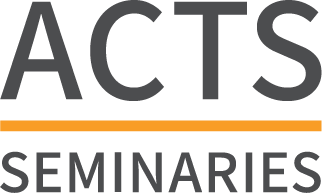

https://libguides.twu.ca/RES502
RES 502 Online - Research Strategies
A GRADUATE LEVEL INTERACTIVE COURSE IN INFORMATION RESEARCH SKILLS
prepared by William Badke
ASSIGNMENT TWO
In this assignment, you will be searching for books. While we have a classic catalogue that searches only for books and media (not journal articles), we have a search tool - "Library OneSearch" - that searches for all of our resources at once. For the purposes of this assignment, however, you need to go to the library home page (http://www.twu.ca/library/) and choose "Books" from the various options in the main search box. This will limit your search to books initially.
Library searches, whether they be for books or for articles are never as simple as they may appear. In this book search exercise, you will start with keywords, a type of search you probably know well, but there will be options on the results page to refine what you have found in ways not possible through a Google search. In advance of doing this assignment, it is
crucial that you read Research
Strategies,
chapters four to six, very
carefully, even if you consider yourself to be a searching whiz.
There is a logic to finding
information in databases, and you must
understand that logic
if you want to be efficient in
retrieval. For information on the use of Trinity Western's Library OneSearch search tool, see http://libguides.twu.ca/LibraryOneSearch.
Keywords and
Controlled Vocabularies
The most difficult concept for students is the difference between keywords and controlled vocabularies. They are not at all the same, and you need to study the differences until they become very clear to you. The textbook, chapter 5, is devoted to subject headings.
A significant number of assignment #2's submitted by students are returned because the controlled vocabulary/subject heading search was done incorrectly. Please be sure you understand the concept before you submit the assignment (more information below). ![]() The
most important thing to remember is that controlled vocabularies, such as subject headings, are search
terminology created by librarians.There is no opportunity create your own subject headings or even to revise existing headings. You
have to take them as given. Keywords, on the other hand are
created by you. You have the power to shape them any way you
want. Keywords are words found in titles, etc. Subject headings tell you what a book or article is actually about. They
are a way of pulling together everything on a subject regardless of what words are used in
titles.
The
most important thing to remember is that controlled vocabularies, such as subject headings, are search
terminology created by librarians.There is no opportunity create your own subject headings or even to revise existing headings. You
have to take them as given. Keywords, on the other hand are
created by you. You have the power to shape them any way you
want. Keywords are words found in titles, etc. Subject headings tell you what a book or article is actually about. They
are a way of pulling together everything on a subject regardless of what words are used in
titles.
With keyword
searching, consistently the biggest problem I see is that searchers
start
with
too MUCH terminology. I recommend that you start with two or three search words.
If that produces
too
much
material, then add a word or two. Simplicity generally wins over
complexity in keyword searching. Remember that, for an AND search, every
word
you add eliminates results
from your
list. Some of those results might
potentially
be useful. Keep
searching simple
unless lack of sufficiently narrow results calls
for more
complexity.
Finding Subject Headings
Library OneSearch (access from the main search box on the library home page) starts with keyword searching, but it has a robust subject heading system as well. Note the difference: Keywords are words found in titles, etc. Subject headings don't depend on words in titles. Instead, they are descriptors that tell you what a work is actually about. (More information at http://libguides.twu.ca/LibraryOneSearch) Consider this sequence (below):
1. Initial search box - Use the Books tab, search on Historical Jesus, and set the dropdown box to Title. This creates a search on words in book titles.

2. Have a look at your results
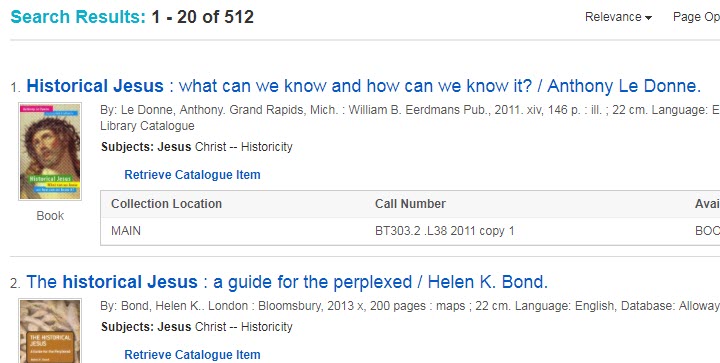
At this point, you may think you are done, but 512 results is a lot. Some will be highly relevant, but some will not.
3. Limit by subject heading (found in the column to the left of your results) to reduce result numbers and improve relevance: Jesus Christ--Historicity

4. You now have 75 highly relevant results
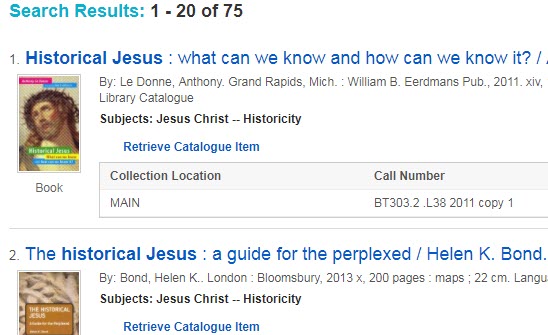
5. Choose some results to put in a temporary folder
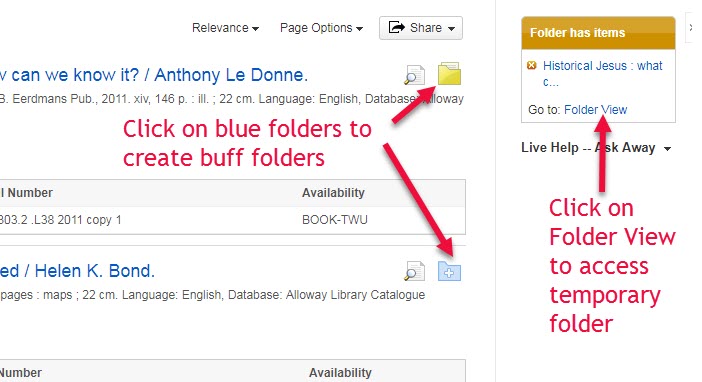
6. Within the temporary folder you can save citations that can be formatted in Chicago/Turabian Humanities or APA formats. Alternatively you can download your citations to a bibliographic manager like EndNote (more on this below).
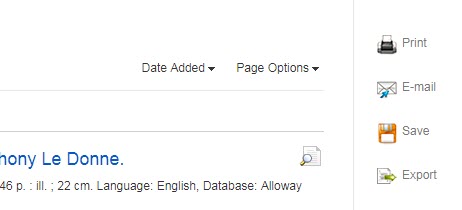
For more information on using Library OneSearch, see the tutorial at http://libguides.twu.ca/LibraryOneSearch.
Bibliographic Managers - EndNote Basic
Bibliographic managers enable you to collect citations to various resources (books, articles, etc.), put them in folders, and generate bibliographies in various formats. They are a bit complex to learn, but they can be a valuable source through your student career and beyond.
EndNote Basic (http://www.myendnoteweb.com) is free (though you need to sign up for an individual account), and you can keep it as long as you want. I strongly recommend that you start using it to formulate citations. You will find a set of tutorials to help you get started at http://libguides.twu.ca/EndNote/.
Creating Formatted Citations without a Bibliographic Manager.
If you find that EndNote Basic is simply too complex for you, it's best if you do not use it for these assignments.
Alternatively, you can create book citations using WorldCat (http://www.worldcat.org.) Here is a guide to help you with that. Some other e-book platforms allow you to create citations by adding references to a folder and using either the Save or Cite function to the right.
A very useful alternative is Citation Machine (http://www.citationmachine.net/). Formats are listed near the top of the screen. For most uses, "Chicago" is the same as Turabian.
Another tool which can help you format book and article citations is KnightCite (http://webapps.calvin.edu/knightcite/index.php). You will have to select Books from the left, then enter the required information.
Note that computer-generated citations can have serious challenges. Here is an example of things you may need to revise.
Computer citation: Le Donne, Anthony. Historical Jesus : what can we know and how can we know it?. n.p.: Grand Rapids, Mich. : William B. Eerdmans Pub., 2011., 2011. Alloway Library Catalogue, EBSCOhost (accessed December 1, 2017).
|
The Errors: Le Donne, Anthony. Historical Jesus : what can we know and how can we know it?.
|
What it should look like: Le Donne, Anthony. Historical Jesus : What Can we Know and How Can We Know It? Grand Rapids, Mich. : William B. Eerdmans Pub., 2011.
|
For a good guide to Turabian formats use http://www.press.uchicago.edu/books/turabian/turabian_citationguide.html. Note that there are TWO Turabian formats, Author-Date and Humanities format. ACTS uses the Humanities format, which calls for footnotes or endnotes rather than short, in-text references. The Turabian site linked above uses the Humanities format.
For a guide to APA, go to http://www.wisc.edu/writing/Handbook/DocAPA.html
Use these one of these guides to "fix" your computer-generated citations.
![]()

Read Research Strategies, 6th edition, Chapters Four to Six.

For each of your topics:
A. State your research question.
B. Go to the main search box on the library home page to begin your searching.
For each of your
research questions, start with a Books search, choosing the "Title" option, to identify books relevant to your research question. (If you don't get enough results, change the Title option to Keyword):

The Books tab searches both print books and e-books. If you want only one type (e.g. e-books), use the limiter in the column to the left of your results.
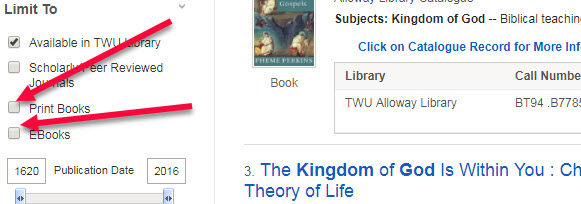
Indicate what search
words or word combinations you tried (e.g. Homeless* AND
Philadelphia). If your first search doesn't work, use lateral thinking to
find other ways that title words could be used to produce relevant
results, but avoid multiplying the various search
combinations you use. Instead, use critical thinking to come up
with a few narrow and highly relevant terms. Note that the truncation symbol for Library OneSearch is *.
Be
sure to indicate what successful Keyword combinations you used. List each search you did on a separate line:
Kingdom Luke
Kingdom Gospel Luke
C. Make a list of ten books relevant to each research question in alphabetical order by author (thus you will have two lists of ten items each). Include author, title,
place of publication, publisher and date, and
use either the Chicago/Turabian: Humanities or APA format. Turabian
is to be used for most topics, but APA can be used for psychology-related topics. You MUST list all books
in this assignment in either Turabian humanities or APA format. For
information on ways to do this, see the backgrounder above. Remember that there are two Turabian formats. You want Chicago/Turabian: Humanities format rather than Chicago/Turabian: Author-Date format.
For Turabian, these examples will explain the differences between the two Turabian formats. Use the second format, not the first:
Chicago/Turabian: Author-Date format: Badke, William B. 2005. The Hitchhiker's Guide to the Meaning of Everything. Grand Rapids, MI: Kregel Publications. Don't use this format.
Chicago/Turabian: Humanities format: Badke, William B. The Hitchhiker's Guide to the Meaning of Everything. Grand Rapids, MI: Kregel Publications, 2005. Use this format.
For APA format, the citation should look like this:
Badke, W. B. (2005). The hitchhiker's guide to the meaning of everything. Grand Rapids, MI : Kregel Publications, 2005.
D. Put an asterisk next to the most highly relevant titles. These ones will be helpful in guiding you to the correct subject headings to use for the next part of this assignment.
E. Be sure that your bibliographies are in alphabetical order by author. Don't number bibliographies. If you want to make them hanging (normal format in which second and following lines are indented), do this:
Select the whole bibliography ![]() Right click
Right click ![]() Paragraph
Paragraph ![]() Special
Special ![]() Hanging
Hanging ![]() OK.
OK.

For
your
each of your research questions, redo the searches you did in Part Two. This time, narrow your results by subject heading. Please be aware that up to half of all students get their assignments returned because they did not understand subject heading searching. Make sure that you have grasped the concept.
Instructions: To see how to narrow by subject headings, go to http://libguides.twu.ca/LibraryOneSearch/Limiters and view the box entitled: Types of Limiters Available. All subject headings are in the column to the left of your results. If you don't see a subject heading you want, click on the Show More link below the subject heading list.
Be sure to indicate what subject headings you used, listing each on a separate line. Be sure they are actual subject headings rather than your own created keywords.
Note that, with subject searches, success depends on how many results you had before you narrowed by subject. For example, if you have 700+ results, narrowing by subject should be relatively easy. If you have only 25 results, there will be fewer subject headings available, and they will lead you to fewer actual results. Here's how to address this problem, if you encounter it. Either:
i. Search more broadly. Note that books tend to be broad. Instead of searching on Climate change and Arctic and silver foxes, search on Climate change Arctic. This will get you a larger number of initial results.
ii. If you can't search more broadly and you have few initial results, use the subject headings anyway, even if this produces only 2 or 3 results. Show the subject headings you used, list the results, and explain that there are few because you didn't have many initial results.

Comment on which search (subject heading or keyword title)
was most profitable, and on how much overlap
there was in results found by each search (i.e. how
many results were the same).
![]()
Rubric for Assignment Two. Highest grade meets these criteria:
Last updated: April 23, 2018